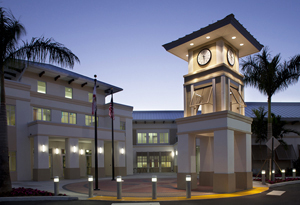The Wellington Village Council heard a presentation Tuesday, July 13 on the village’s proposed $133.2 million budget for fiscal year 2021-22. The council approved a Truth In Millage (TRIM) property tax rate of 2.47 mills with a drainage assessment of $230 per unit, both rates unchanged from the current year.
Deputy Village Manager Tanya Quickel presented the proposed budget and TRIM figures. She explained that the millage rate on the village’s $9.3 billion in taxable value will yield about $21.8 million in tax revenue, up about $1 million over the current year. Total revenues are estimated at $99.7 million. “Reserve funds balance the budget as planned with no increase in ad valorem taxes for operations and maintenance budgets,” Quickel said.
The total preliminary budget is up significantly from the currently year’s budget of $101.6 million, including inter-fund transfers. However, the $31.2 million increase is primarily due to capital improvement projects. Additionally, increases in operating costs are budgeted for increases in materials and supplies, and the return to full operations following cancellations and reductions in programs and operations as part of the pandemic response.
If approved, the budget would fund 236 full-time governmental positions, 90,728 part-time hours, six supplemental positions and two interns. In the enterprise funds, the budget funds 66 full-time positions, 1,560 part-time hours, eight supplemental positions and one intern.
The fairly aggressive capital improvements program includes $8.23 million for Town Center Phase II; $4 million for the South Shore/Pierson Intersection Project; $1.5 million for Aquatics Complex Design; $1.35 million for the Aero Club Widening Project; and $900,000 for the Sheriff’s Substation Design, among a number of other projects.
There are also more than $10 million in improvements to utilities infrastructure.
Mayor Anne Gerwig stressed that the budget is only proposed at this point. “If there are things I don’t like in the budget, is now the time to bring them up it?” she asked.
However, the only decision for the council to make this week was TRIM approval, which sets the maximum tax rate. The tax rate can be lowered after TRIM approval, but not raised.
“This is only a proposed budget to come up with the TRIM rate,” Councilman Michael Drahos said.
Quickel noted that the council previously made a commitment not to raise the tax rate, and the budget was set up with that in mind.
“This is the third year of a five-year commitment the council made to hold taxes at 2.47 mills,” she said. “This figure was the average of the previous 10 years before that three-year-old agreement began to hold the figure consistent. On a $300,000 house, it amounts to a $10 increase for a homesteaded property and a $15 increase for a non-homesteaded property.”
Those increases are based on rising property values.
“And on a $600,000 house, it would be $20,” Councilman Michael Napoleone said. “Just do the math.”
The increase could be more for newer property owners.
“We are seeing some increases because of people who are not homesteaded that have now bought new properties and aren’t eligible yet for the exemption,” Quickel said.
Vice Mayor John McGovern noted how that could be good for the village’s bottom line.
“There are people buying second homes and not receiving the homestead exemption at all, which gives the village a tax bump as well,” he said. “All we are discussing here tonight is the absolute maximum of the millage rate that we are going to charge. We are setting the ceiling; we are not setting the floor.”
The council expressed consensus that village staff had done a fine job in developing a budget that could live within the 2.47 mills target tax rate.
“The federal government has helped to make the village whole for expenditures it made and revenues that were lost due to the pandemic,” Quickel noted.
In other business:
• Village Attorney Laurie Cohen explained that a state law was passed allowing fireworks, including mortar devices, to be fired on July Fourth, New Year’s Eve and New Year’s Day.
“The village was particularly concerned about the impact this would have on the equestrian community and submitted a local bill that did pass, providing an exception within the equestrian community of Wellington for those three days to offset the law that allows such fireworks to be used,” she said.
Gerwig and McGovern were not happy that the original law passed in the first place.
“There is apparently a large fireworks lobbying effort that got the law passed in Florida,” Gerwig said.
“The local law reverses what has just been allowed by the state law,” McGovern explained, but just in the Equestrian Preserve Area.
• A discussion about leasing the K-Park property on State Road 7 was pulled from the agenda without comment.








